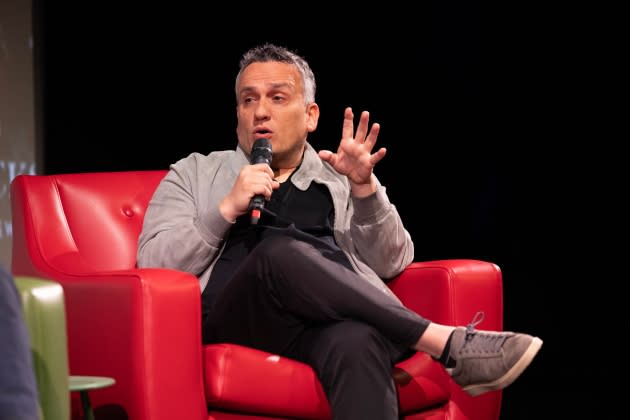“We’re In A Post-Movie Star Era”: Joe Russo And Cinetic Media’s John Sloss Talk Streamers & Modern Stardom – Sands Film Festival
- Oops!Something went wrong.Please try again later.

The topic of streaming loomed large over the keynote industry session of the Sands Film Festival’s second edition, featuring Joe Russo and Cinetic Media founder John Sloss.
The pair were joined on stage by British writer-director Adura Onashile (Girl), with Deadline’s Mike Fleming on hosting duties, and he launched the panel by asking the group whether they believe it is now easier to cut through as a new filmmaker following the explosion of the streaming market.
More from Deadline
“It was easier 15 years ago,” said indie veteran Sloss, whose credits include Boyhood, Boys Don’t Cry, and Green Book. “Even though there is more money than ever for content, because of the pandemic and the interruption of all rights distribution, most of that money comes from the streamers, and they aren’t looking to discover new voices. They love it if they have a foolproof chance of that, but that’s not their business.”
Russo, who has worked with Apple and Netflix, and is readying a new series for Prime Video, challenged Sloss, saying he believes streamers have increased the range of stories and filmmakers audiences are exposed to.
“I believe streamers have done more for diversity in five years than the theatrical business has done in 100 because they intend to be global, and so they are using regional voices to attract viewers in those markets,” he said.
“For example, Squid Game, that show wouldn’t work ten years ago. It only works on Netflix, where 200 million people watch it. And it helps, in my opinion, to break down the barrier of subtitles. So streamers are compelling in that regard.”
Onashile, whose debut feature Girl played Sundance and Göteborg, echoed Russo’s sentiment, adding that British producers are starting to display a new interest in subversive projects.
“There’s a real appetite for different types of stories, and certainly from a UK point of view, there’s been a push recently to diversify the stories we’re seeing on our screen. But it’s tough,” she said.
While Russo and Onashile were optimistic about the effect streaming has had in some parts of the industry, the Grey Man filmmaker warned the audience that they should not expect streaming companies to display any loyalty to the theatrical distribution model.
“There is no serious commitment from Netflix to screen movies in theatres. There just isn’t. And when they do, it’s to appease a filmmaker who wants it in a theatre,” he said.
“You’ll get a week and a very small P&A spend. It’s antithetical to their business model which is to be at home watching the streaming service. I don’t fault them for that. That’s their business model. If you wanna make a movie for the theatre, go to Sony or Disney.”
Stardom and Nonfiction Filmmaking
Elsewhere, the panel discussed the future of non-fiction filmmaking, with Russo declaring that streamers have done more to increase the popularity of documentary films than anyone else in the film business over the last “30 or 40 years.”
Sloss added that streamers are bolstering the distribution of docs, but the growing popularity is also an inadvertent result of a decrease in the draw of classically defined movie stars.
“We’re in a post-movie star era except for maybe Tom Cruise,” he said, explaining that few stars are able to draw people to the theatre.
“The idea that non-fiction stories aren’t as compelling as fiction is gone. There’s no real distinction unless you’re seeing a movie star. So the notion that documentaries are ghettoized or less commercial stories than scripted films has disappeared.”
The first company to notice this trend, Sloss said, was Netflix.
“They didn’t tell us because they keep their data to themselves, but they started paying us more for documentaries. And we figured it out.”
While the allure of movie stars may be waning, Russo concluded that the idea of FOMO, the fear of missing out on an event, is the strongest way to draw audiences into theatres.
“When we make a decision to do something theatrically there has to be an element of FOMO [fear of missing out] involved with the storytelling that can compel you to get off TikTok,” he said, “or not watch Netflix and go to a theatre because you want to be part of a conversation.”
He added: “This is why the Marvel films worked.”
The keynote audience featured a mix of local filmmakers, industry professionals, and students from the University of St. Andrews, a co-organizer of the Sands film festival.
Russo’s AGBO is a primary sponsor of the festival.
This year’s edition ran from April 14-16.
Best of Deadline
Hollywood & Media Deaths In 2023: Photo Gallery & Obituaries
2023 Premiere Dates For New & Returning Series On Broadcast, Cable & Streaming
Sign up for Deadline's Newsletter. For the latest news, follow us on Facebook, Twitter, and Instagram.

